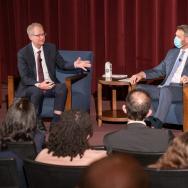President Paul Alivisatos, University and community leaders, and Chicago Police Department Superintendent David Brown joined Mayor Lori Lightfoot on Saturday for a conversation about collaborative, community-based strategies to improve safety throughout the city, including Hyde Park and neighboring South Side communities.
The group was convened by Lightfoot’s office, a little more than a week after UChicago alum Shaoxiong “Dennis” Zheng was killed during a robbery near campus, and days after a town hall meeting in which University leaders and Brown discussed enhanced safety measures across campus and in neighboring communities.
“Safety is my unequivocal top priority, and the partnerships with the mayor, the City and the many community groups that were brought together today are critical for us,” Alivisatos said during the media availability following the Nov. 20 roundtable discussion, held at the University’s David Rubenstein Forum. “We’re committed to working with our community leaders to address long-term issues, as well as the short-term law enforcement approaches that we’ve discussed, and so today was an important event for us to listen to community leaders to develop some joint plans.”
In her remarks, Lightfoot also stressed the need for greater partnerships, and she said that listening to the community and focusing on collaborative, long-term solutions beyond policing would be key to addressing the root causes of violence in the city.

“The only way forward is to be united with a common sense of purpose and make investments in our young people, for their benefit and the benefit of our city for decades to come,” Lightfoot said. “We are doing that hard work every day, and I know that I’m speaking not only for members of my administration but for people of the faith community, for community-based organizations, who have been doing this hard work for decades.”
Lightfoot stressed the importance of creating opportunity and alternative trajectories for families and young people in the city and acknowledged the representatives of local churches, nonprofits and other community-based groups who participated in Saturday’s discussion. “I am grateful to [President Alivisatos] and really the entire University community, that understands what needs to be done and is fully committed in making sure that we work together on behalf of our residents.”
During Saturday’s roundtable discussion, Alivisatos expressed gratitude for the City’s commitment to forging a deeper partnership to address these issues, noting that University leaders have been in close contact with Lightfoot and Brown since Zheng’s murder on Nov. 9.
“This is an all-hands-on-deck effort,” Alivisatos said. “It will require wide-ranging community partnership. Today was an important opportunity for us to listen to local community leaders and to begin identifying opportunities for collaborative efforts to make our communities safer.”
He said the University is identifying opportunities to leverage its strengths in academic thought and practice, working in tandem with South Side communities, to address critical issues, including mental health, education, child welfare, social policy and economic opportunity.
“This is an all-hands-on-deck effort. It will require wide-ranging community partnership.”
"We're in a competition for these children—a tug-of-war with the streets,” said Karen Freeman-Wilson, president and CEO of the Chicago Urban League, following the roundtable discussion. “We have to work together at all levels, including government, corporations, philanthropy, and the social sector, to identify the most at-risk kids early and connect them with community interventions and programs. This will not be easy, but it is absolutely essential to create a positive influence in their lives that outweighs the negative influences."
Alivisatos, Lightfoot and Brown said they and other leaders will continue listening, facilitating conversations, and working together to develop multifaceted strategies to address public safety.
“This is not a one-and-done conversation. It cannot be; we’ve got to continue on,” Lightfoot said. “There are a lot of incredibly good and thoughtful ideas that were brought to the table today by our community partners, and we want to make sure that we’re following up on them. I’m committed to making sure that we also use our convening power to facilitate more discussions, more education, and more innovation in ways we can craft interventions at every point in the lifespan of our residents to help them lead better, healthier, stronger lives, and make our communities more vibrant.”








